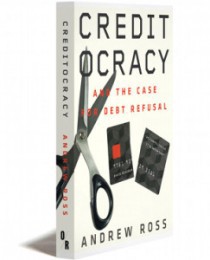Debt in America

Is materialism driving indebtedness? People want things: the debt is incurred to accumulate them. Or is it the reverse? Do we have this boom in the last few decades of so-called “easy credit” and was this availability of “easy credit” pushing people into consumerist consumption? Which is the cart and which is the horse?
That is a good question. I think the most significant factor has to do with household income. Since the mid- to late 1970s, average household income has either been stagnant, or, according to some metrics, falling. When you are in that kind of situation, credit-fueled spending is really the only way of sustaining a certain quality of life. Increasingly, households are in the position of having to seek out fresh credit simply to perform existing debt service. People aren’t borrowing to make material improvements in their quality of life, but to meet the basic requirements of life, which to my mind includes access to vital social goods like health care and education and public infrastructure.
Do you feel that debt — the loaning of money — is moral?
Morality is a big part of how we talk about this issue, of course, because pay-back morality is the most effective instrument that the finance industry has at its disposal.
Can we agree, though, that credit has a legitimate and positive role to play in society?
Very much so. The alternative economies being discussed now are geared towards creditors of the socially productive kind, whereas our current money economy is largely fueled by predatory credit. Lending, in and of itself, is absolutely necessary to any economic system. It’s just a question of whether it’s going to be socially productive or whether it’s being done purely or primarily on an extractive basis, to generate income for the creditor class.
The Los Angeles Review of Books has a really interesting interview with Andrew Ross, the author of Creditocracy, which examines debt in the U.S. and our “predatory debt-money system that only benefits the 1%.”
Ross defines “creditocracy” as:
1. governance or the holding of power in the interests of a creditor class
2. a society where access to vital needs is financed through debt
Support The Billfold
The Billfold continues to exist thanks to support from our readers. Help us continue to do our work by making a monthly pledge on Patreon or a one-time-only contribution through PayPal.
Comments